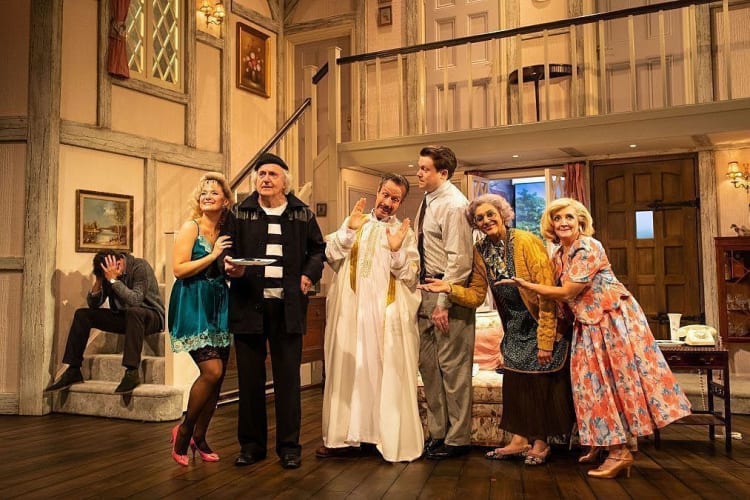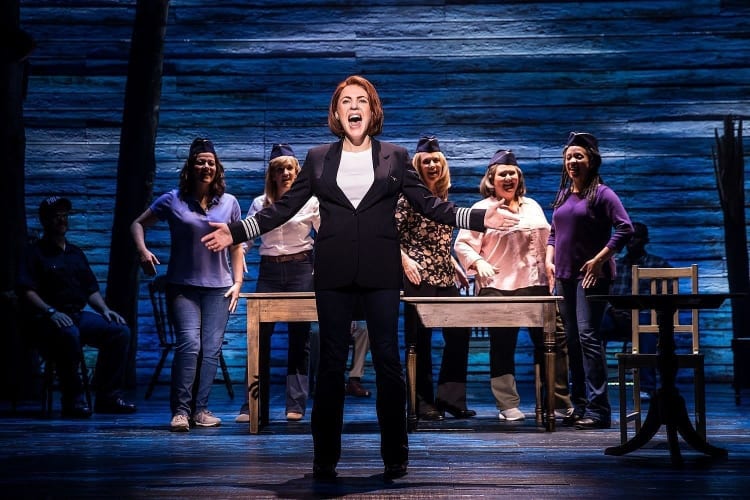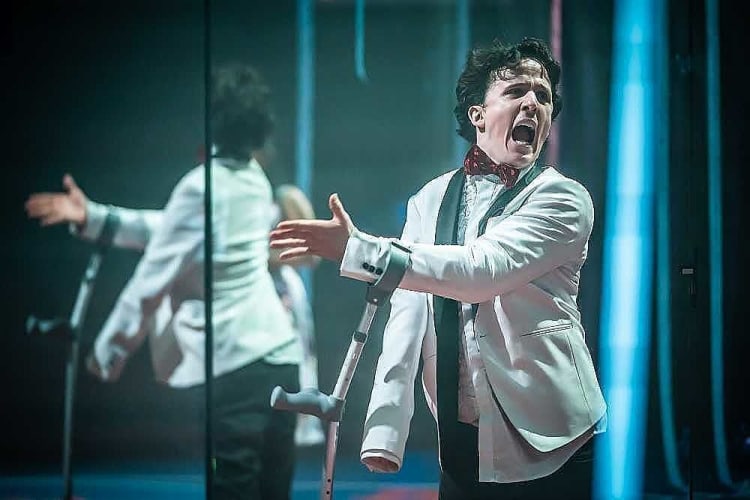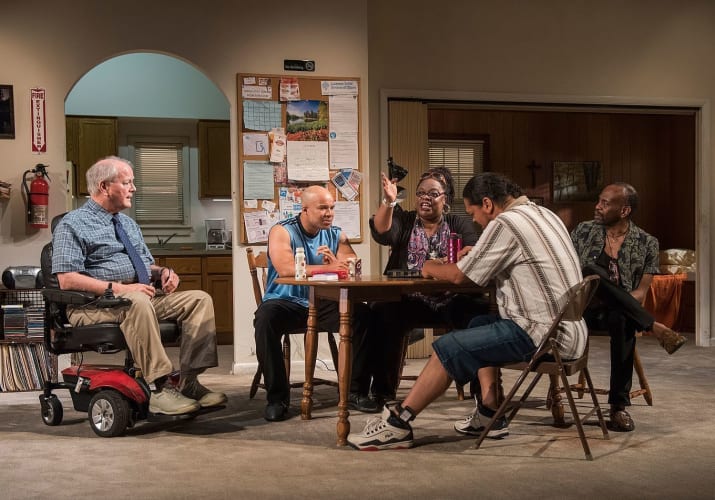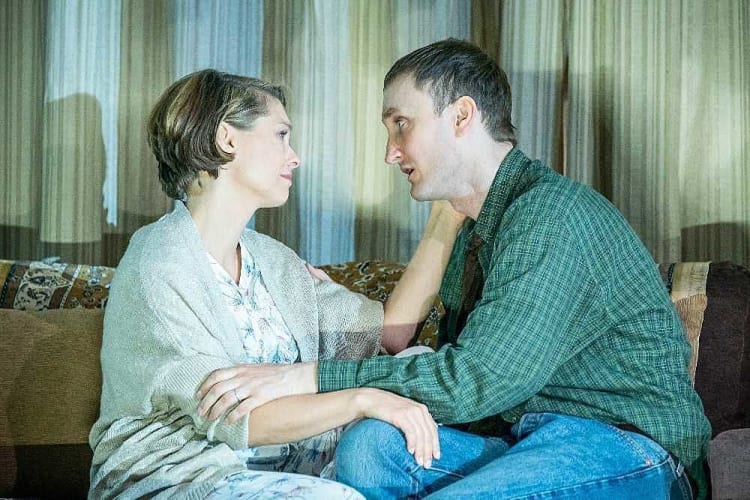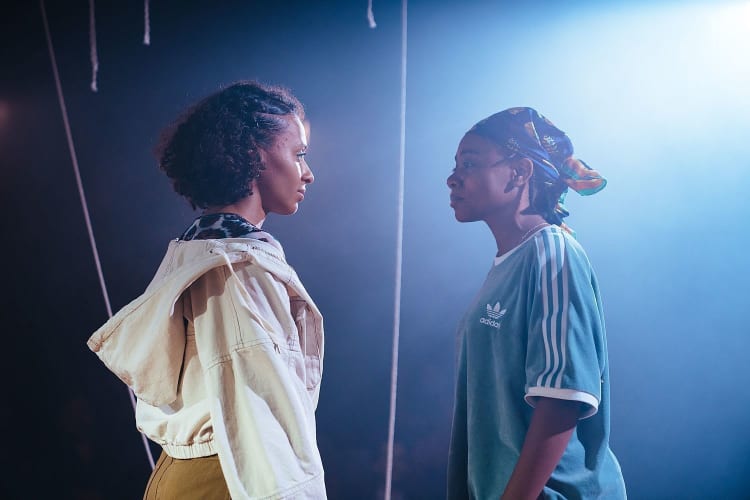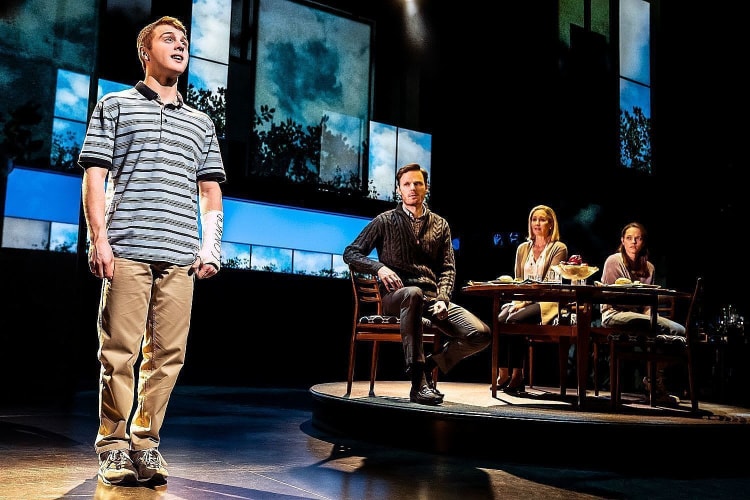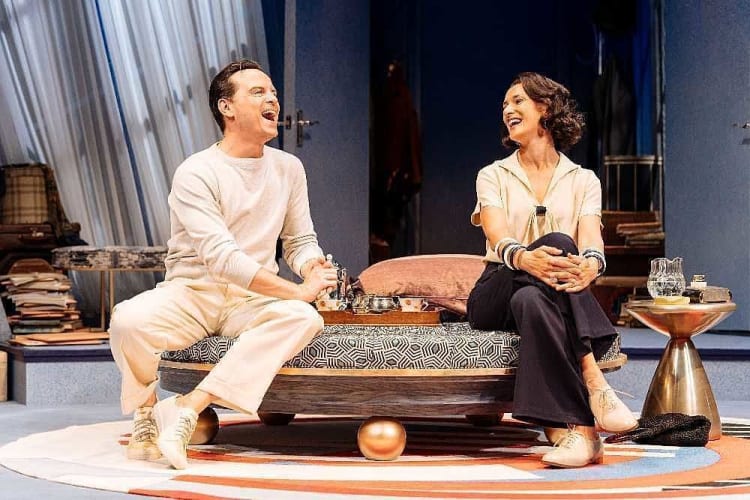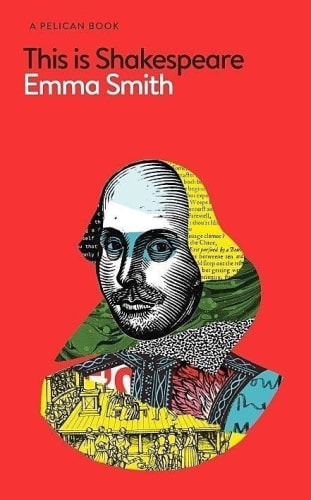Other Major Theatres
Almeida Theatre
Rupert Goold has turned the Almeida into the home of psychologically acute productions stripped of period and colour that, more often than not, take classics and pare them back to the bare bones.
Four productions at the venue fell into this category, which almost inevitably leads to strongly divided opinion. For this critic, Mike Bartlett’s new version of Gorky’s Vassa was the pick, turning a Russian classic into an Ortonesque black comedy. The production owed a great deal to a remarkably accomplished performance from Siobhán Redmond, bearing in mind the fact she only stepped into the title role at the very last minute.
Rebecca Frecknall has succeeded Robert Icke as the director of choice for this style of production. Her Three Sisters in a new version by Cordelia Lynn had enough drawing power to enjoy a West End transfer, while towards the end of the year she directed a stark, modern take on The Duchess of Malfi. By taking out most traditional design elements and any sense of the original period, this latter production forced viewers to concentrate almost entirely on the acting, which was greatly to the benefit of Lydia Wilson in the title role.
Another top actress, Juliet Stevenson, starred in The Doctor, a modern version of Arthur Schnitzler’s Professor Bernhardi, “very freely” adapted by Icke, his last production on the theatre’s payroll. This too is scheduled to head for the West End in 2020.
There were also a couple of contemporary plays at the venue. The Hunt by Thomas Vinterberg and Tobias Lindholm, adapted by David Farr proved to be a tense thriller capturing much of the excitement of a very dark Danish movie on stage. Anne Washburn’s Shipwreck was a wild and undisciplined piece that tended to ramble rather than hitting its target’s bull’s-eye.
Donmar Warehouse
There was a change of personnel at the Donmar, as Josie Rourke stepped down to be replaced by Michael Longhurst. The new incumbent got to grips pretty quickly, hitting a splendid high with Teenage Dick. This unlikely masterpiece purloined the basics from Richard III and bolted them on to a kind of American school Brat Pack plot with Daniel Monks delivering an unforgettable performance in the title role.
Before that, the new regime had opened with David Greig’s Europe. This is one of those political plays that will never age, since problems of identity, migration and battles over borders will always be with us.
Appropriate by Branden Jacobs-Jenkins was an intricate family drama that not only proved hilarious but also was deeply thought-provoking. In the year when racial issues became one of the main themes on stages large and small, this was one of the most important and enjoyable contributions to the debate. It also featured a stand-out performance from Monica Dolan.
BLANK is indisputably an oddity. Alice Birch had written a play in 100 scenes for Clean Break about women in prison that would have lasted pretty close to forever. Therefore, she and director Maria Aberg chose approximately one quarter as a representative sample. Having looked at the script, the collections and in particular one extremely long piece towards the end may not have presented the work in the most favourable light.
Royal Court Theatre
You have to admire Vicky Featherstone and her brave mission to discover new writing and ways of presenting it at the Royal Court. Inevitably, this bold agenda will lead to a number of failures at the same time as it unearths a string of unlikely gems.
Before heading to the new discoveries, one must pay tribute to Caryl Churchill, who continues to write fresh, fascinating plays into her ninth decade. Glass. Kill. Bluebeard’s Friends. Imp. was a quartet of short plays that were amusing if not necessarily earth-shattering. As always, this playwright toyed with form at the same time as addressing important contemporary issues from oblique angles.
seven methods of killing kylie jenner by Jasmine Lee-Jones might just be pointing the way towards the future of theatre. This vibrant new play has something of the appeal of performance poetry, backed by an exciting soundtrack. To quote from the original review “the primary purpose of this play is to highlight the young black experience as seen by women in their early 20s today, harking back to the days of slavery but also exposing their ultra-modern views about racial difference and sexuality amongst other topics.” It was exhilarating.
Superhoe by Nicôle Lecky trod similar ground. This witty solo show focused on a young black woman trying to come to terms with the inherent disadvantages of an average South Londoner who would like her share of privilege but struggles to get by—other than in some unlikely fantasies.
Selina Thompson’s salt. featured a much darker solo performance but, again, addressed the black experience as a woman from Birmingham headed back through the familial generations to the days of slavery.
A Kind of People by Gurpreet Kaur Bhatti was issue-led play about racial difference in Britain today that felt clunky but left behind some powerful messages.
the end of history… from the prolific Jack Thorne was a family drama that promised much but, despite some interesting insights, didn’t necessarily deliver as much as it might have.
Anchuli Felicia King’s White Pearl almost felt out of place at the Royal Court, since it was a light sitcom. The attractions for the theatre will almost certainly have attached to strong opportunities for female performers and underlying issues of race and nationality. Pleasingly, the humour shone through an enjoyable if hardly demanding evening.
Pah-La by Abhishek Majumdar was a challenging, ambitious work exploring politics and religious philosophy from the unusual perspective of a Buddhist nunnery in Tibet
Young Vic Theatre
The Young Vic has become home to a programme that puts racial issues at its forefront and does so in a highly intelligent but sometimes confrontational manner. This was never clearer than in the final play of the year, Fairview by Jackie Sibblies Drury. Without the need for blood and guts, this carefully constructed masterpiece will not only have shocked many of those paying for the pleasure but also potentially changed the way that they think about race. This year’s Pulitzer Prize winner was certainly controversial and unforgettable. It was also arguably one of the best plays of the London year.
The biggest commercial success for the theatre was Death Of A Salesman. Marianne Elliott directed a recast version featuring black actors in all of the key roles, led by Wendell Pierce as Willy Loman. Although the adaptation was not entirely flawless, after a sell-out run on the South Bank, the production moved into the West End, unfortunately literally bringing the house down at the Piccadilly when the ceiling collapsed. Even that was not enough to dampen enthusiasm for a popular night out.
Jesus Hopped the ’A’ Train by Stephen Adly Guirgis has quickly established itself as a modern classic and Kate Hewitt’s suspenseful revival proved that a play about prejudice set in a terrifying prison remains both timeless and timely.
Director Yael Farber presented an unusual but satisfying and highly atmospheric vision of Lorca’s Blood Wedding. Marina Carr has written a bold new version of the play that hit viewers right between the eyes.
Tree courted a great deal of controversy, thanks to a web storm that will have acted as an unintended publicity machine. Attaching the name of Idris Elba to anything at the moment is a guarantee of success. This search for identity and roots, directed by co-writer Kwame Kwei-Armah, succeeded as much due to its overall impression of life in South Africa as some heartfelt writing about family and love.
Hampstead Theatre
Hampstead was another theatre welcoming a new but very experienced Artistic Director in Roxana Silbert.
Although she didn’t direct it herself, allowing Michael Boyd the privilege, Miss Silbert’s debut was The King of Hell’s Palace by Frances Ya-Chu Cowhig. Set in China a quarter of a century ago, this play attempted to bring what was effectively a hidden world to life for Londoners and largely succeeded in achieving this goal.
Edward Hall started the final year of his long tenure with a fine play, Cost of Living by Martyna Majok. Taking place in New Jersey, this slice of Dirty Realism starring Adrian Lester was set amongst the Polish-American community, struggling to come to terms with life’s vicissitudes, none more so than the character played by former Paralympian Katie Sullivan.
The Phlebotomist by Ella Road, which was promoted from the Downstairs space to the main stage, was a dystopian nightmare that required rather too much contrivance to achieve its goals.
Botticelli in the Fire was a very strange play by Jordan Tannahill, which modernised the story of a Grand Master of the art world, seemingly more interested in the impression that it was making than the history.
The Downstairs space tends to be an opportunity for workshopping, although pieces like Roy Williams’s The Firm could just as easily have debuted on the main stage. Set in a pub populated by hard-nosed gangsters and seeking realism, it harked back to the days when plays could just be written to entertain rather than feel obliged to shock or pander to politically correct whims.
Hannah Patterson’s Eden appear to be a thinly veiled but relatively mild attack on the man who sees himself as not only the leader of the free world but is simultaneously continuing his career as a businessman. Michael Simkins thoroughly enjoyed himself in the central role during what turned out to be lightweight but pleasant evening.
Menier Chocolate Factory
The Menier Chocolate Factory presented an interesting variety of work, unquestionably led by Laura Wade’s wonderful The Watsons. What starts out as a faithful stage representation of Jane Austen’s unfinished novel melts into a joyous post-Pirandello romp featuring the playwright herself (or an actress in the role to be more accurate) that is absolutely hilarious.
This year’s Christmas musical from a theatre that has made these a speciality was Sandy Wilson’s The Boy Friend. Strangely, this is a show that was written to seem dated and, with its lovely songs and old-fashioned romantic story, might just follow so many of its predecessors into the West End.
Sir David Hare’s The Bay at Nice was revived by Sir Richard Eyre with a cast led by Penelope Wilton. It is a quiet, contemplative look at the art world and generational divides and felt rather dated but still enjoyable.
The other major revival was Tamara Harvey’s take on Orpheus Descending by Tennessee Williams, an odd play that looks into the heart of a closed community through the eyes of a drifter musician.
The Bridges of Madison County was a perfectly serviceable but hardly ground-breaking stage version of the novel, which was also made into a popular Hollywood romantic movie.
Kiln Theatre
After a massive refurbishment, the Kiln in Kilburn quickly got back into its stride, despite the fuss over its name change.
The best of the bunch at this venue was undoubtedly The Son, the latest from Florian Zeller, with his translator of choice, Christopher Hampton. This intense family drama, which is heading for the West End, looks deep into the mind of Laurie Kynaston’s Nicolas, the troubled teenage son of a broken marriage. The general assumption is that entertainment is supposed to cheer and uplift but sometimes reflecting the world, warts and all, can be equally valuable.
Maintaining the family theme was Samuel Adamson’s Wife. Although the fact was not used in the marketing, this was a meditation on Ibsen’s A Doll’s House. Rather than a few days, the play crosses almost a century starting in 1959 and, in four bites, looks at those trapped in a number of different and differing relationships.
Snowflake by Mike Bartlett, a yuletide show the grown-ups, spent an age getting going before making quite incisive comments about generational difference and politics in Britain today.
Inua Ellams mixed Yoruba and Greek myths in The Half God of Rainfall. Although it is staged, this poetic two-hander is largely an example of adept storytelling, especially since director Nancy Medina eschewed props and design to concentrate all eyes on the commendable efforts of the actors.
When the Crows Visit was set in India today and started out as a light comedy. The primary themes of a work that also borrows from Ibsen, in this case Ghosts, as with so many other plays at present include generational differences in a family setting and more particularly the troubles that sons inherit. By the end, it delved deeply into the contemporary zeitgeist with shocking consequences.
Approaching Empty by Ishy Din noted the difficulties of second-generation immigrants in the North of England through the medium of a family-run cab company. Having promised much of the first half, sadly it dissolved into a bland, run-of-the-mill comedy after the interval.
Lyric Hammersmith
The Lyric Hammersmith is yet another theatre that welcomed a new artistic director, Rachel O’Riordan.
Before her arrival, one of the year’s highlights, Jeremy Herrin’s delightful revival of Noises Off by Michael Frayn almost literally had audiences rolling in the aisles. This is undoubtedly one of the funniest plays ever written and, even though it didn’t quite hit every line in Hammersmith, by the time it reached the West End this glorious stage farce deserved to be the hottest ticket in town.
Ibsen has had a lively year, with adaptations of his plays abounding. Miss O’Riordan’s debut was a new version of A Doll’s House by Tanika Gupta. This was set in India during the heyday of the Raj and cemented a very positive impression of actress Anjana Vasan, who has had a very good year. She played Niru, a trapped wife with the additional twist that her husband was an upstanding Englishman. This racial slant changed the balance of the play considerably, not necessarily illuminating the original but certainly providing great food for thought.
Solaris by David Greig was a co-production between his Royal Lyceum from Edinburgh and Malthouse of Melbourne, which contributed director Matthew Lutton. This adaptation of Stanislav Lem’s novel of the same title turned out to be the kind of cult sci-fi offering that primarily appeals to fans of cult sci-fi.
Kneehigh’s Dead Dog in a Suitcase by Carl Grose with music by Charles Hazlewood was a radical and anarchic new interpretation of The Beggar’s Opera. As such, it proved to be exactly what one has come to expect from this reliable company.

